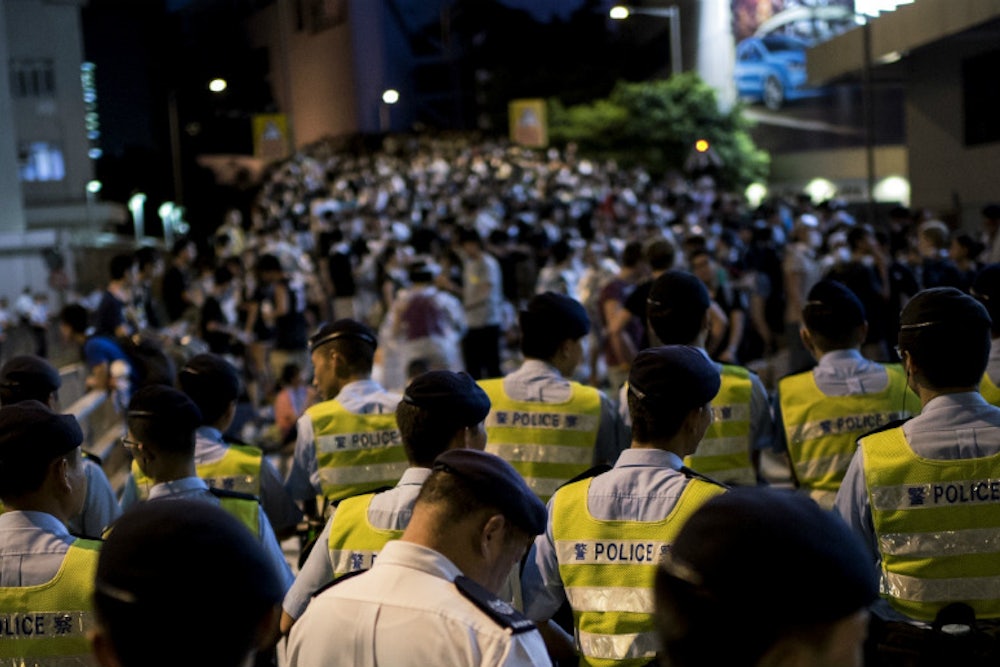I met John on Tuesday in Mong Kok, the shopping district of Kowloon where the previous night a man had driven a Mercedes-Benz through a crowd of protestors, fueling rumors that hired thugs were trying to cause trouble for the Occupy Central movement. John, who was carrying a backpack with a yellow ribbon pinned to the strap, told me there had also been reports of cars filled with weapons parked nearby. I asked how he knew so much, and he surreptitiously pulled a card out of his pocket: a police ID.
Despite explicit warnings that police should not attend the protests, John, who preferred not to give his real name, decided to come because he wanted to support the movement—especially after the cops used tear gas on protesters Sunday night. “In my opinion, force is not necessary,” he said.
In the battle for public opinion over the recent pro-democracy rallies in Hong Kong, the city’s police force has come out looking bad. The decision to use tear gas and pepper spray against nonviolent protestors pointlessly, in some cases, since the police then pulled back—drew condemnation from protest leaders and lawmakers. The assistant commissioner of police defended the use of what he called “minimum force.” But the crackdown turned the police into the villains they hadn’t been before. On Connaught Road, a thoroughfare usually flooded with traffic but now occupied by protestors, someone sprayed painted the words “HK police = Shame on you.” Many protestors, rather than being deterred by the show of force, were more determined than ever. “I’m not satisfied with what the police did,” said Benny Wong, 20, a nursing student who was skipping class to voice his dissent.
It wasn’t always this way. Compared to police forces in, say, New York or Los Angeles, Hong Kong police always had a sterling reputation. Hong Kong children are raised to respect “Uncle Policeman,” and given the city’s low crime rate, most citizens’ main interaction with police is asking for directions. (In 2012, Hong Kong’s murder rate was one-fourteenth that of New York City.) “They’re well-trained, polite, efficient,” said Marc Yan, 29, a protestor who works in IT. “They’re the best police in China.”
That’s partly what made John want to be a cop in the first place. The other part was that his dad had been a policeman, before he changed jobs and became a private driver. Now he’s working part-time as an auxiliary constable to help pay his way through college.
Most protestors I spoke with sympathized with the plight of the police. “They don’t want to hurt any Hong Kong citizens,” said Andy Loh, 25, a travel guide whom I found near a barricade outside the police headquarters. “They just listen to their bosses.” Icarus Cheng, a 30-year-old financier, said he had friends on the force who had been working nearly straight for the previous 30 hours. “They’re suffering,” he said. “Of course, we are too.” Part of the problem is that, while Hong Kong has plenty of protests, they rarely occur on this scale, and with the outcome so unpredictable. “Policemen don’t have much experience handling this situation,” he said.
The police don’t seem especially offended by the protesters either. “They’re nice,” said a youthful officer who was guarding the headquarters on Tuesday. He said that some students have offered him and his colleagues food and drinks, which of course they have to refuse. (A similar thing occurred at the Tiananmen Square protests in 1989, and some hungry officers accepted.) I asked what he thought of the movement overall. “Freedom of speech,” he said.
John said that so far he hasn’t been called upon to deal with protestors. If he were, he might have to make some tough decisions. He said that if a superior commanded him to use tear gas or any other kind of force against protesters, he’d refuse. He suspected that a lot of his colleagues felt the same way—maybe a third, he guessed—but they never talked about it openly. No matter what happens, he said, he has no plans to quit the police force. “Hong Kong needs policemen,” he said. “Most of the police are still protecting the citizens.”
